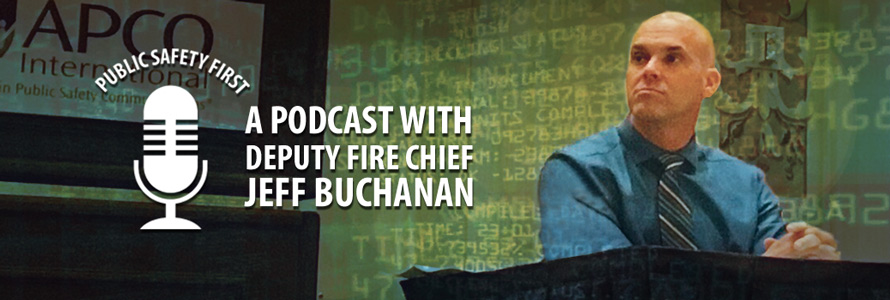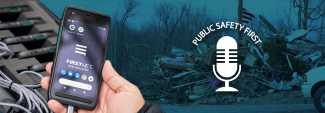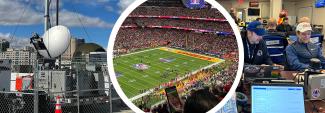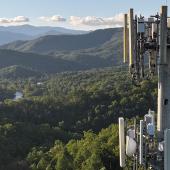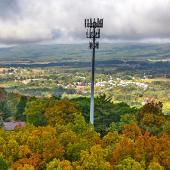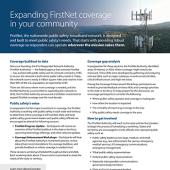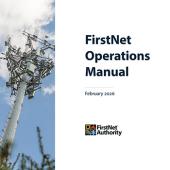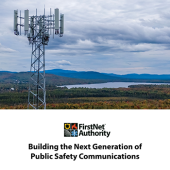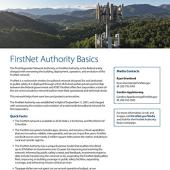Summary
Jeff Buchanan, Deputy Fire Chief of the Clark County Fire Department (NV), speaks about the unique challenges Las Vegas first responders face and the critical need for priority and preemption during major incidents such as the Route 91 Harvest Festival shooting.
Guest
Dave Buchanan
FirstNet Authority Executive Director of Public Safety Advocacy
Deputy Chief Jeff Buchanan
Clark County Fire Department, Nevada
Transcript
Preview
Narrator: You’re listening to Public Safety First, a podcast to help you learn about the First Responder Network Authority and how you can be a part of the future of public safety technology.
And now, your host Dave Buchanan.
Dave Buchanan: We are on the ground at APCO in Las Vegas. We’re working closely with Public Safety to tell the story of FirstNet—from panels on innovating for Public Safety, to stories from the field about how FirstNet is being used today. I have with me here today Clark County Deputy Fire Chief Jeff Buchanan. Jeff joined us on a panel about innovating for Public Safety where a great conversation was had about implementing change in Public Safety organizations and how to overcome some of the challenges you may face.
Jeff, thanks for joining us here today!
Jeff Buchanan: Glad to be here, thanks for having me.
Narrator: You’re listening to Public Safety First, a podcast to help you learn about the First Responder Network Authority and how you can be a part of the future of public safety technology.
And now, your host Dave Buchanan.
Dave Buchanan: We are on the ground at APCO in Las Vegas. We’re working closely with Public Safety to tell the story of FirstNet—from panels on innovating for Public Safety, to stories from the field about how FirstNet is being used today. I have with me here today Clark County Deputy Fire Chief Jeff Buchanan. Jeff joined us on a panel about innovating for Public Safety where a great conversation was had about implementing change in Public Safety organizations and how to overcome some of the challenges you may face.
Jeff, thanks for joining us here today!
Jeff Buchanan: Glad to be here, thanks for having me.
Dave Buchanan: Can you tell me a little bit about your agency, your fire department?
Jeff Buchanan: Sure, Clark County Fire Department is a combination department, so we have volunteer and full-paid firefighters. We cover an area of about 8,000 square miles, which is roughly the State of New Jersey. We have 30 urban fire stations, we have 13 rural fire stations and together, we run over 150,000 incidents a year. So, we're a very busy department and we handle some of the highest profile real estate in the world, the Las Vegas Strip.
Dave Buchanan: And, what's your job at the fire department?
Jeff Buchanan: I'm a Deputy Fire Chief, one of several, and my main function is having oversight over support services, which includes information technology, fleet, our personal protective equipment, and some other ancillary items.
Dave Buchanan: So, you talk about your responsibility in Clark County, including the Las Vegas Strip, talk a little bit more about what makes being a first responder in Clark County unique.
Jeff Buchanan: Well it's unique, number one, because of our call volume. If you look at similar departments across the country that have roughly 650 firefighters, or better yet 30 fire stations, they're running about half of the amount of incidents that we're running, so our volume is unique. It's exceptional, and I don't say that because, quite frankly it's a cliché across the country; most fire departments think that their departments are busy.
The reality is, not all of them are, it depends on what the metric is, but we are, we're very very busy, we're the busiest in the state. We share a combined Communication Center with North Las Vegas, in Las Vegas, in which we do a cost share, and that cost share is divided by the amount of calls that we run, and we run 52 percent of the total call volume, whereas North Las Vegas runs about 8 percent, and then the remainder is Las Vegas Fire and Rescue.
Dave Buchanan: Can you talk a little bit more about how you collaborate with other public safety agencies? What's that like here in Las Vegas and Clark County?
Jeff Buchanan: We enjoy great partnerships with both police and fire. We have a very very sound deployment plan. We're essentially North Las Vegas, Las Vegas, and Clark County, and Henderson to a certain degree. We have what's called auto aid so it means that there's really no jurisdictional boundaries—it's the closest unit goes to the call. I think that relationship with police departments—both Metro, Henderson, and North Las Vegas, and those fire departments—have a seamless relationship. There's a lot of trust and it offers a lot of interoperability, and a lot of efficiencies. So, we have here in Southern Nevada, we have a great relationship.
Dave Buchanan: What kind of technology do you use in your fire department today?
Jeff Buchanan: So we're using primarily Motorola radios out in the field, and we do have cellular service. Of course, we have our MCTs [Mobile Computer Terminals] that get our units to the scene, which use GPS and AVL (automatic vehicle locators), which helps the dispatch center put the right unit, the closest unit, on the closest call. We use touch screens; we try to stay up on innovations, and most recently, we're looking forward to getting on the FirstNet network as we're in that process right now.
Dave Buchanan: That's terrific, Jeff! Can you talk about, what do you think is the most important feature for FirstNet as you're looking forward to adopting the network for your fire department?
Jeff Buchanan: Well, I'd like to answer that first with a little bit of a recap of some of the events that have happened in Clark County over the course the last 12 months: Route 91 happened in October of last year – greatly impacted, Clark County in general. Specifically on that night what we witnessed was a tremendous amount of traffic on the commercial network, which was causing some serious interruptions in critical information exchange. And what I mean by that, I was trying to get a hold of the incident commander, I was trying to share information that was critical to some of the operations that were going just to the east of the stage. I was unable to, because every time I texted, and every time I called, the commercial carrier was full. Why? Because all of those thousands of calls that were going on. So, at that point in time, I knew we needed FirstNet. I knew from the history that I’d had in the last several years, and my understanding of FirstNet, that priority and preemption, that's the number one benefit that we think we need here in Clark County, and that quite frankly, I think will help Public Safety in general.
Dave Buchanan: It's not hard for a visitor who comes to Las Vegas to see the crowds, and see the hotels, and see the casinos, and how what a huge task delivering public safety services must be here. Are there other times, when you've experienced that kind of congestion, or other times with other large events you're responsible for, where this is going to be beneficial to you?
Jeff Buchanan: Absolutely. With regularity, is the answer to your question. Any other times—it could happen multiple times in a week. Every year, we have one of the largest New Year's Eve celebrations in the world, and it happens on the Las Vegas Strip where hundreds of thousands of people converge in a tight area. We deploy an extra hundred personnel out into the field.
Metro Police Department will put another five hundred to a thousand officers out in the field. So, there's a lot of congestion that can be had on commercial networks, another opportunity for FirstNet, that's just one event.
Every year we have the Electronic Daisy Carnival; there's another 300,000. We're going to have NFL coming to Las Vegas, which we're very excited about, and they're building that stadium here in our back yard, in Clark County. So, there will be another 80,000 for at least fifty to a hundred events a year. I think the public might get, they might misperceive that it's only a football stadium. There's going to be NCAA Final Four basketball games there, there's going be large-scale concerts. That is going to be a premier venue, really in the entire world, definitely here on the Strip. It doesn't stop there. We have multiple arenas, we have multiple large attendance events that are happening so frequently that not only is it going to be a benefit to public safety, it's a necessity.
Dave Buchanan: So, you're responsible in your fire department for the communication services and responsible for the, you know, helping make the decision about FirstNet. Can you describe how that went for you, who else is involved? Were there challenges in describing these attributes, and what was that process like for you inside Clark County government?
Jeff Buchanan: Definitely challenges, any time you're talking about such a critical decision there's a lot of people that need to be involved. Certainly end users, certainly people at my level at the deputy chief inside of the fire department, the fire chief and, specifically, for those who were a part of my team, is the information technology experts. They needed some more
information they were confused about what it is, “Is this FirstNet? What is priority and preemption? Do other commercial carriers have these same attributes?” And that's just within our organization.
Outside of our organization we have to get other people involved in the governmental structure that involves the key decision-makers and information technology at the county level. You need to make sure that the people that are in charge of the finance, that could be the Director of Finance, it could be people that are dealing with purchasing. There's a large area of government that need to be included in large-scale decisions like this, and so it's really about getting a lot of people involved. So, you have to make sure that there's a lot of stakeholders when making such a big decision.
Dave Buchanan: So, that's very helpful for us to hear Jeff. Our job at the First Responder Network Authority is to engage public safety and help prepare them for the decision they're going to make and help them find the best ways to optimize the network inside their agencies. It sounds like what you're describing is that people involved in a decision in Clark County went far beyond Public Safety and went inside the local government beyond your fire department.
Jeff Buchanan: Yeah, I think you're summarizing it pretty well. The reality is, is any decision for public safety or any other department inside a governmental structure will have other
decision-makers involved. The police chief has a boss; the fire chief has a boss. So, the focus can't be solely on public safety; there has to be an understanding of government and when you're talking about that understanding of government you're talking about the people that make the decisions in purchasing from budgeting, from strategizing. You at times have to get the politicians involved and ultimately the CEO of any government at the local level is going to be the city manager or county manager. So, you want to make sure that your net is cast pretty wide and that the focus isn't just on Public Safety because they're not just the only ones that get to make those types of decisions, even though they sit in pole position in their organizations as a fire chief or the police chief, part of their responsibility is to sell their bosses that they're making the right moves for the community too.
Dave Buchanan: So, Jeff, as you've talked about the benefits of FirstNet inside your fire department, I know you've had conversations with your chief, I know you've had conversations with folks who are much younger in their career. Can you talk about what some of their questions were, maybe some of their concerns and what opportunities they saw for FirstNet inside your department?
Jeff Buchanan: Yes, so I'll split that question into two different demographics. One demographic could be the more youthful individuals that are coming into the fire service, a tech generation, a generation that understands instantaneous information delivery, Instagram, Facebook, Snapchat, which I know nothing about, let me make that perfectly clear, but they're tech-savvy, and app savvy, and they are just at a higher level when it comes to technology. I think FirstNet offers those evolutions, those advancements, and frankly, simultaneously a benefit to public safety, and also an incentive to those users to come and use me and look what it can do for your industry. I think there's one segment of benefits for that group.
And then there are those that have been the fire industry for 15 or 20 years and where they may not be so interested in applications and perhaps the technological advancements. I can tell you what they are impressed with, and that will be priority and preemption. That's an easy concept to grasp. There isn't an incident commander in police or fire that wants their communications interrupted. That vital critical information that needs to get to the end user— that firefighter, that police officer to give a location or to distribute critical information—it cannot be interrupted. Priority and preemption from FirstNet will ensure that that communication is seamless and that that does not happen.
Dave Buchanan: Thank you for your time Jeff this has been very helpful and I know our listeners are going to learn a lot from our conversation today.
Jeff Buchanan: I'm very excited to be here on behalf of our Fire Chief, Greg Castle, who's a big proponent for FirstNet. We're excited to be part of it and look forward to future conversations.
Dave Buchanan: Thank you.
Narrator: Thanks for listening today. We're excited to have you join our podcast community make sure to subscribe on iTunes, SoundCloud, and YouTube. You can learn more about the First Responder Network Authority at FirstNet.gov and learn about FirstNet products and services at FirstNet.com.


